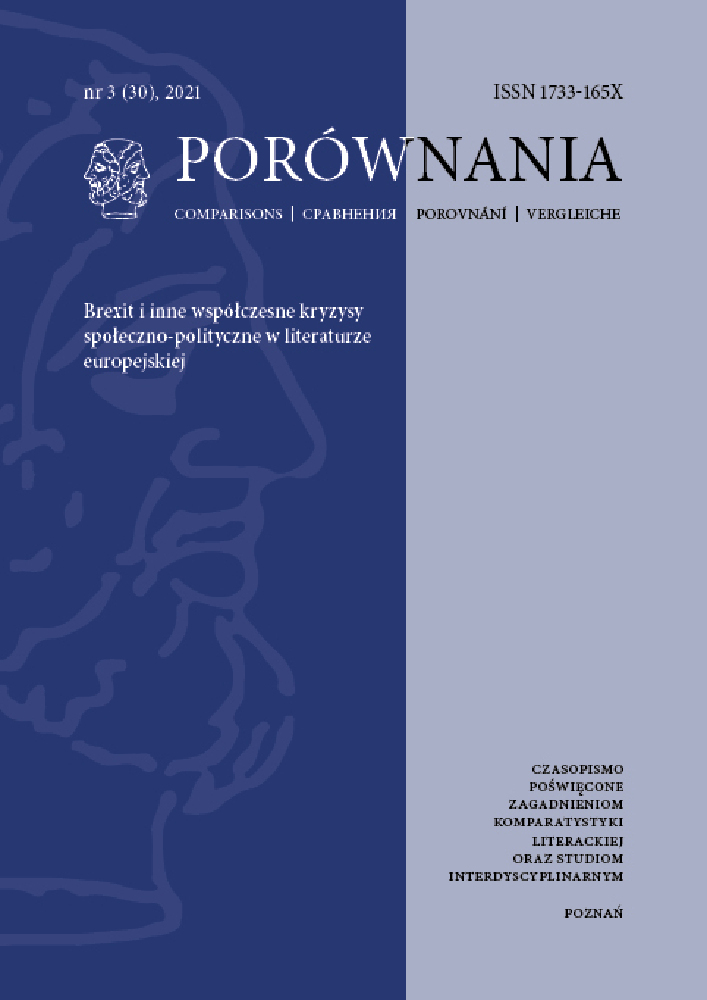Abstract
The present article scrutinizes the phenomenon of a systemic silencing of the past visible in recent socio-political challenges caused by Brexit, especially in the case of the Irish border. Due to the comparative character of the paper, the attention is targeted at a symptomatic amnesia manifested on the British and Northern Irish sides. Postcolonial melancholia, to use Paul Gilroy’s term, facilitated by a systemic whitewashing of British imperial past, is contrasted here with Northern Irish postcolonial amnesia understood as a personal and institutionalised suppression of the difficult memory of colonisation and violence. In what follows, the paper aims to show how these two phenomena meet in the conflict of Brexit and how literature comments on the current political, social and cultural issues such as Brexit based on the example of Anna Burns’ novel Milkman (2018). The article discusses the silence which has surrounded the issue of the Irish Border in Brexit debates, as well as looks at the Northern Irish reluctance to talk about their past as an unsuccessful attempt to escape the demons of the past.
Literaturhinweise
Burns, Anna. Milkman. London: Faber & Faber, 2018.
Carroll, Rory. “Karen Bradley Admits Ignorance of Northern Ireland Politics.” The Guardian, 7 Sept. 2018, https://tinyurl.com/yzh6vp4b. Accessed 28 Feb. 2019.
Carson, Ciaran. “Brick.” Belfast Confetti. Winston-Salem: Wake Forest University Press, 1989. 72.
Cooper, Charlie. “Boris Johnson faces up to his history moment.” Politico, 19 March 2020, https://tinyurl.com/yazmnn9y. Accessed 3 April 2020.
Drong, Leszek. “Remembering a Transcultural Past: Recent Post-Tribal Fictions of Seventies Ardoyne.” Critique: Studies in Contemporary Fiction 61.2 (2020): 171–180.
Drong, Leszek. “O mrocznym Mleczarzu w wasserenglish.” (“On Milkman in Wasserenglish”) Wachtyrz.eu, 25 Nov. 2018, https://tinyurl.com/8ntfzp7f. Accessed 28 Feb. 2019.
Gandhi, Leela. Postcolonial Theory: A Critical Introduction. Crows Nest NSW: Allen and Unwin, 1998.
Gilroy, Paul. Postcolonial Melancholia. New York: Columbia University Press, 2005.
Heaney, Seamus. “Whatever You Say Say nothing.” North. London: Faber and Faber, 1975. 57–60.
Johns, Chris. “Semantics of Brexit Means Nobody Knows What’s Going On”, The Irish Times, 10 Jun. 2018, https://tinyurl.com/4xm9kfue. Accessed 6 April 2021.
Keefe, Patrick Radden. Say Nothing: A True Story of Murder and Memory in Northern Ireland. London: William Collins, 2019.
Leebody, Christopher, and Jonathan Bell. “Both Sides Committed ‘Serious Criminal Offences,’ in Belfast Disorder.” Belfast Telegraph, 8 Apr. 2021, https://tinyurl.com/fz9zrc5m. Accessed 9 April 2021.
Łojek, Aleksandra. Belfast. 99 ścian pokoju. (Belfast. 99 Peace Walls.) Wołowiec: Wydawnictwo Czarne, 2015.
Moriarty, Gerry. “Winston Churchill Name-checked in Belfast as Clock Ticks towards Brexit.” The Irish Times, 30 Dec. 2020, https://tinyurl.com/2dyyaesc. Accessed 25 Jan. 2021.
O’Carroll, Lisa. “‘Nobody wants us’”: Fears of Forgotten on Northern Irish Border.” The Guardian, 29 Sept. 2019, https://tinyurl.com/2r6s6a5p. Accessed 1 Oct. 2019.
O’Toole, Fintan. “Brexit Fantasy is About to Come Crashing Down.” The Irish Times, 25 Jun. 2016. https://tinyurl.com/pxsrwbzt. Accessed 6 April 2021.
Patterson, Glenn. “Belfast, a Brick and the G8 Summit.” The Guardian, 20 Jun 2013. https://tinyurl.com/pkxxhj4. Accessed 1 February 2021.
Sutcliffe, Tom. “Milkman.” The Orwell Foundation, https://www.orwellfoundation.com/political-fiction/milkman/. Accessed 13 January 2020.
“The Booker Prize: 2018 Winner Milkman.” The Booker Prizes, https://thebookerprizes.com/fiction/backlist/2018. Accessed 30 January 2021.
Watts, Joe. “Brexit: Boris Johnson Says Handling Irish Border Problem like Managing Congestion Charge Boundary between London Councils.” The Independent, 27 Feb. 2018, https://tinyurl.com/4yrfspey. Accessed 28 February 2019.
Lizenz
Utwory opublikowane w czasopiśmie „Porównania”, na platformie Pressto należącej do Uniwersytetu im. Adama Mickiewicza w Poznaniu są udostępniane na licencji Creative Commons Uznanie autorstwa - Bez utworów zależnych 4.0 Międzynarodowe (CC BY-ND 4.0)
Tym samym wszyscy zainteresowani są uprawnieni do korzystania z utworów opublikowanych pod następującymi warunkami:
-
uznania autorstwa — czyli obowiązek podania wraz z rozpowszechnianym utworem informacji o autorstwie, tytule, źródle (odnośniki do oryginalnego utworu, doi) oraz samej licencji
-
bez utworów zależnych — remiksując, przetwarzając lub tworząc na podstawie utworu, nie wolno rozpowszechniać zmodyfikowanych treści.
-
brak dodatkowych ograniczeń — nie można korzystać ze środków prawnych lub technologicznych, które ograniczają innych w korzystaniu z utworu na warunkach określonych w licencji.
Uniwersytet im. Adama Mickiewicza w Poznaniu zachowuje prawo do czasopisma jako całości (układ, forma graficzna, tytuł, projekt okładki, logo itp.).
Autor zachowuje prawa majątkowe, ale udziela zgody Uniwersytetowi im. Adama Mickiewicza w Poznaniu na wykorzystanie dzieła. Autorzy tekstów zakwalifikowanych do publikacji proszeni są o wypełnienie podpisanie i przesłanie umowa (PL) agreement (EN)
Agreement for granting a royalty-free license to works with a commitment to grant a CC sub-license





